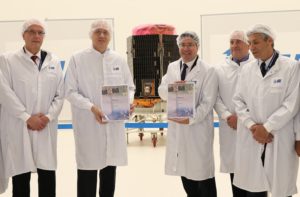
Having completed its assembly, Israel parted from Venµs, the first Israeli-made satellite created for environmental research purposes. Within the next few days, the satellite will go on its way to the launcher located in French Guiana.
At an official ceremony held at, May 25th, at Israel Aerospace Industry (IAI) Space division, IAI handed over the Venµs satellite to the Israeli Space Agency in the Ministry of Science and its partner, the French National Center of Space Studies (CNES). The satellite will now be merged with Arianespace launcher and prepare for the launch that will take place this summer in French Guiana.
Israel’s Minister of Science and Technology, Ofir Akunis, said at the ceremony: “Venµs is the feather in the cap of Israel’s space industry. I am extremely proud that the first research satellite initiated by the Israeli government and the Ministry of Science will be launched shortly. As the Minister of Science, I regard it as a pivotal goal to encourage the younger generation to become thought-provoking scientists and use their creativity for the good of the environment and for advancing innovation. The collaboration with France reiterates the immense appreciation with which Israeli technology is received all over the world.”
Joseph Weiss, IAI’s President and CEO, commented, “We are excited to deliver Venµs Research Satellite to the Israeli and French space agencies. The best satellite and space engineers of the Israeli industry participated in this unique flagship project, which marks yet another technological feat for IAI in particular and for Israel’s industry in general. The collaboration with France in exploring space has provided us with an opportunity to expand the horizons of our international collaborations with new content worlds. I believe this project forms solid foundation for continued new cooperation.”
Jean-Yves Le Gall, CNES President, said, “With the COP21 and COP22 having highlighted the key role of satellites in studying and preserving our climate, I am delighted to see our world-class space engineers working together to develop Venµs, a mission that will help the international community’s efforts to curb climate change, and to see that our cooperation is set to continue, notably on the MEMS gyroscopes.”
Venµs is a joint flagship project of Israel’s Space Agency in the Ministry of Science and the French Space Agency. The satellite has been built over the past few years at IAI’s Space division in collaboration with Elbit, which developed the telescope and RAPHAEL, which developed the propulsion system. The satellite will be used to observe fields and lands from space for environmental research, monitoring the condition of the soil, vegetation, forestation, agriculture, water sources quality and more. Venµs is equipped with a special camera capable of capturing details on earth in 12 wave-lengths, including details which are not visible to human eye. The Satellite will photograph huge spaces, providing researches with dozens of daily images, each one covering approx. 700 square meters. Once every two days, the Satellite will generate photos of the entire area of Israel to be used by researchers. The Satellite will weigh 265 kg at the time of the launch and will enter a sun-synchronous orbit 720 km high within two days from the launch.
Original published at: https://spacewatch.global/2017/05/israel-aerospace-industries-hands-ven%c2%b5s-satellite-israel-space-agency/
 SpaceWatch.Global An independent perspective on space
SpaceWatch.Global An independent perspective on space

